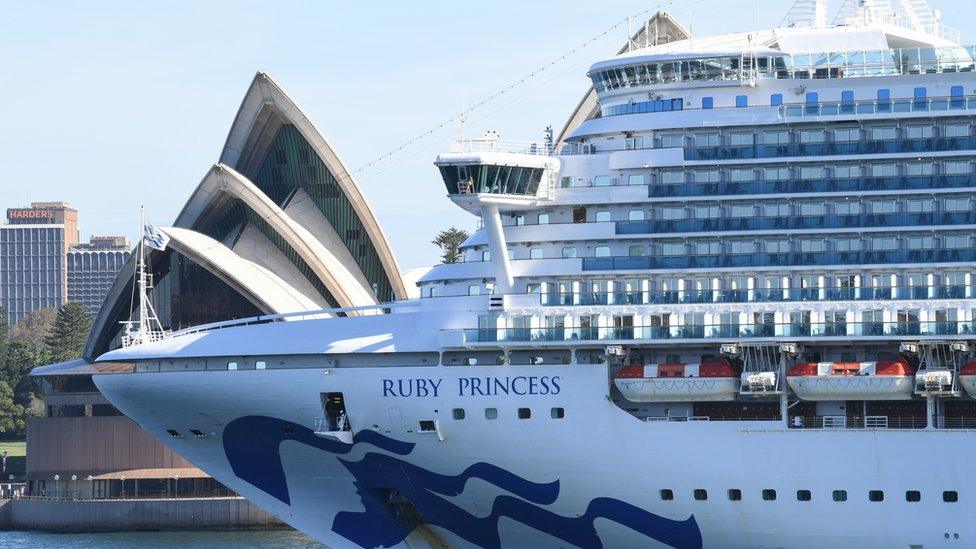Coronavirus: 'Serious mistakes' made over Ruby Princess outbreak
- Published

The Ruby Princess heading out of Sydney Harbour on 19 March
Health authorities in Australia have been heavily criticised in an official inquiry into the Ruby Princess cruise ship coronavirus outbreak.
The inquiry found "serious errors" by New South Wales Health in its handling of suspected cases on board.
All 2,700 passengers were allowed to disembark in Sydney in March without sufficient screening. More than 100 of them felt unwell.
At least 900 people later tested positive. Twenty-eight died.
The ship, carrying mostly Australian passengers, had completed an 11-day cruise from Sydney to New Zealand and back when it docked on 19 March.
The passengers - some seen coughing and spluttering - were allowed to leave the ship at Sydney Harbour, catching trains, buses and even overseas flights to get home.
But the virus did not spread as extensively into the community as some had feared.
Excluding a cluster in the island state of Tasmania which spread through a hospital, 62 people in Australia caught the virus through secondary transmission.
But it was Australia's worst coronavirus episode before the current lockdown in Victoria.
What are the findings?
The Commission of Inquiry, external said all passengers with "acute respiratory illness" or "influenza-like illness" should have been tested for Covid-19, in line with new guidelines issued on 10 March.
"NSW Health should have ensured that cruise ships were aware of the change to the definition of a 'suspect case' for Covid-19 made on 10 March," its report says.
"This would have resulted in the identification of such cases on the Ruby Princess. 101 persons fell within the suspect case definition by 18 March, and 120 by the time the ship docked."
The inquiry describes these as "serious mistakes by NSW Health".
It also describes as "inexcusable" a failure to obtain results immediately from coronavirus swab tests taken on 19 March - the day the vessel docked.
The decision by an expert panel of New South Wales Health to classify the Ruby Princess as "low risk" is condemned as "inexplicable as it is unjustifiable".
A directive on 17 March meant all ship passengers disembarking after arriving from another country should have isolated themselves for 14 days once on land.
Sonia says she now struggles to pay for food, after losing her factory job due to the pandemic
The NSW government, the report says, "should have arranged suitable accommodation for all passengers who were not residents of the state".
Passengers were incorrectly informed that once disembarked, they could travel elsewhere, the inquiry found, despite having been in contact with a Covid-19 case.
Though the advice was corrected by NSW Health on 21 March, it was too late to prevent many travelling onward, "including some passengers who were symptomatic during transit".
The report makes several recommendations, but says that mistakes and failures in decision-making have already been largely recognised by the expert panel and NSW Health.
There are no "systemic" failures that need tackling and those involved are said to recognise "they would do things differently if they had their time again".
What has the reaction been?
New South Wales government leader Gladys Berejiklian said she would read the report over the weekend before responding.
The owner of the Ruby Princess, Carnival Corp, said the report had backed its position that none of its employees had misled the authorities.
"In our more than 20 years in Australia, we have always sought to co-operate honestly and professionally with officials in accordance with the regulatory environment," it said.

A SIMPLE GUIDE: How do I protect myself?
IMPACT: What the virus does to the body
COMPARING COUNTRIES: Why it is not straightforward
GLOBAL SPREAD: Tracking the pandemic
